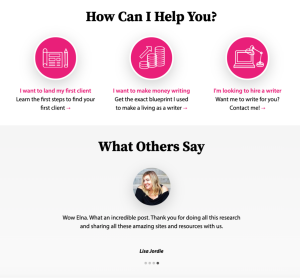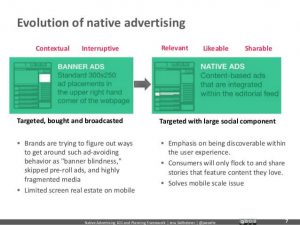The effects of the COVID-19 are devastating: people are forced to stay at home, brick-and-mortar stores are compelled to close, and the mass hysteria strikes fear in just about anyone.
This has led to people experiencing an onslaught of challenges and headaches, especially since the crisis came at such a sudden pace — leaving people unprepared for the catastrophe.
The persons with disabilities (PWDs), for example, are among the group of people that are hit especially hard due to the crisis.
While most people can do their shopping online and be able to obtain their necessities, PWDs struggle with even the most basic act of navigating a website — all because the eCommerce site they’re on isn’t fully accessible.
If PWDs remain unable to read vital information, order food and medicine, and do other things online, this crisis leaves them even more vulnerable.
As an eCommerce store owner, you can help improve your disabled customers’ lives and meet their needs from your shop more handily (and in doing so, thrive during this COVID-19 outbreak).
Here are four ways you can help your PWD customers during the COVID-19 crisis.
1- Make your site accessible
If you want to help your PWD buyers to avail of your products from their homes, you need to make your website accessible.
Accessibility means that PWDs, no matter their impairment, can consume your content, use and navigate your site, among others, without difficulty.
By achieving website accessibility, not only can you assist your disabled shoppers, but you also adhere to the Americans with Disabilities Act (ADA), a regulation that protects PWDs’ rights.
Website accessibility, however, involves a lot of coding and website adjustments — costly ones, at that.
Done manually, it could cost about 20,000 dollars worth of expenses to work with seasoned web developers and other experts, and around 6 to 10 months of redesigning (depending on the complexity of your site).
Not to mention, you can lose all (or some) of the changes and coding on your website the moment it updates — making you vulnerable to ADA-related lawsuits.
To ensure your eCommerce website’s accessibility compliance, you can use accessiBe, an automated web accessibility solution powered by artificial intelligence.
By installing only a single line of JavaScript code, the accessibility icon will appear on your eCommerce website, and the AI will begin analyzing and adjusting your site to become fully-accessible within 48 hours.
Once you’ve fully installed accessiBe, your PWD customers can instantly apply any necessary changes to your interface, such as using more readable font styles, changing text colors, and many more.
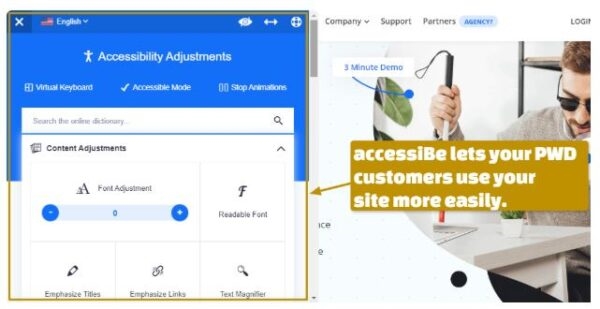
Your disabled customers can also go from your homepage to your product pages, checkout, and others with the Quick Navigation panel that they activate with accessiBe.
The AI, with its Optical Character Recognition capabilities, also helps blind customers using screen readers to identify photos of, say, your products.
With these and other accessiBe features, your impaired customers can more easily purchase what they need from your store, and you can continually grow your business, among others.
2- Offer discounts specifically for PWDs.
Many PWDs have limited income sources. What’s more, their special needs, together with the COVID-19 crisis, further hampers their ability to generate income.
As an eCommerce store owner, you can offer a special discount to help PWDs with their plight.
If you’re wondering how to ensure that your shopper is, in fact, a PWD, you can install a file-uploading app that you can integrate into your form or eCommerce site.
One plugin you can use if you have a store on Shopify, for instance, is Uploadery.
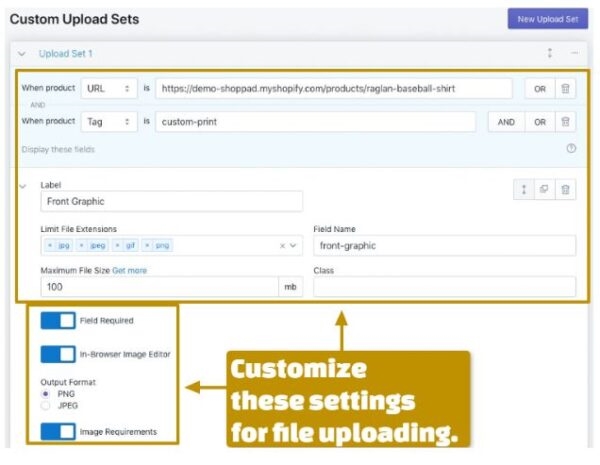
Uploadery lets you receive large files of up to 2GB. It comes with a built-in image editor so your shoppers can crop, rotate, and preview their image files before uploading.
It also lets you streamline your customers’ purchase requests because Shopify attaches the files to the orders and posts them on your admin dashboard.
Now, after you install that plugin with only a single line of code, you can request your customers to upload a copy of their PWD ID card or any other reliable proof.
With special discounts, you can cater more PWD shoppers and assist them more effectively, especially in this crisis.
3- Offer express shipping
Not all eCommerce stores offer express shipping, if you’re one of them, then you need to start adding the express shipping feature now.
Unlike fully-abled people, PWDs might have some circumstances that would require them to get your products as soon as possible.
It could be that your product can help ease the pain that they’re experiencing due to their disability.
Or perhaps your product can help them manage their work better while at home.
The list is endless.
The longer it takes for your products to reach the PWDs, the more they’ll struggle.
As an eCommerce store owner, you need to have a strong sense of responsibility for taking care of your customers’ welfare, PWD or not.
By offering express shipping, you make it easier for your customers to manage their situation during the COVID-19 crisis better.
4- Publish reliable COVID-19 resources
To increase your impaired shoppers’ awareness about COVID-19, you can publish resource materials about the COVID 19.
You can post FAQs, facts, and updates from reliable sources, such as the World Health Organization (WHO), the US Department of Health and Services (HHS), and more.
You can also create infographics and other visuals based on official details, post them on your eCommerce site and social media page and email them to your PWD subscribers.
To design your visuals, you can use tools like Snappa.
Snappa lets you pick your desired type of visual — whether it’s infographics, Facebook posts, or others — along with their ideal dimensions.
It also offers options to customize their design templates or build from scratch. You can then modify various elements, like text formats, shapes, background styles, and more.
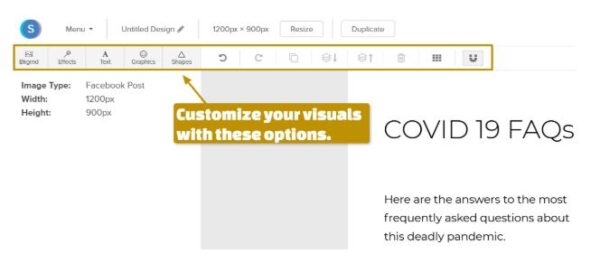
While publishing resources about the COVID-19 might not be directly related to your business operations, doing so is a form of public service that can help your impaired buyers navigate through the crisis.
What’s Next?
The COVID-19 crisis may be a troubling period for people, especially vulnerable groups like PWDs.
However, it offers an opportunity for your eCommerce store to be socially inclusive and responsible by providing quick access to disabled individuals’ essential needs.
It also offers you the benefit of boosting your brand image, customer patronage, conversions, and other aspects of your business performance.
With these methods applied, you can be among the dependable shops that your customers, those with disabilities, can run to especially during the COVID-19 crisis.
Digital & Social Articles on Business 2 Community
(22)





